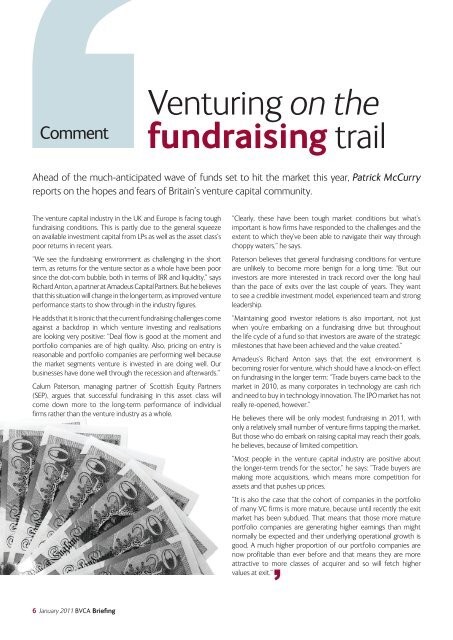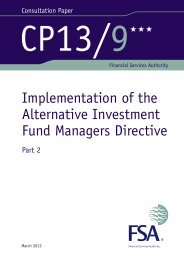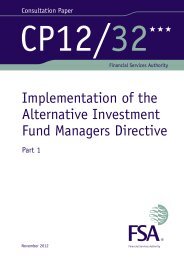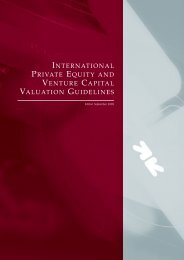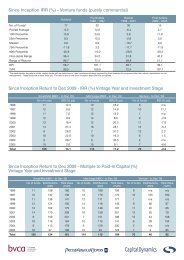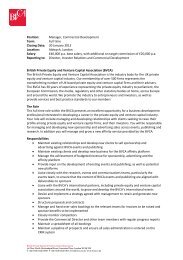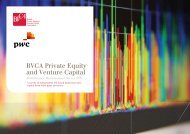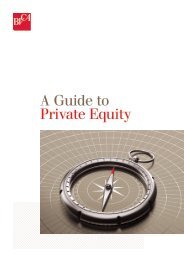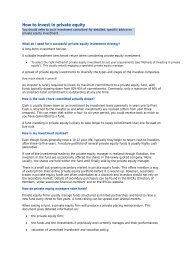fundraising special - BVCA admin
fundraising special - BVCA admin
fundraising special - BVCA admin
Create successful ePaper yourself
Turn your PDF publications into a flip-book with our unique Google optimized e-Paper software.
Comment<br />
6 January 2011 <strong>BVCA</strong> Briefing<br />
Venturing on the<br />
<strong>fundraising</strong> trail<br />
Ahead of the much-anticipated wave of funds set to hit the market this year, Patrick McCurry<br />
reports on the hopes and fears of Britain’s venture capital community.<br />
The venture capital industry in the UK and Europe is facing tough<br />
<strong>fundraising</strong> conditions. This is partly due to the general squeeze<br />
on available investment capital from LPs as well as the asset class’s<br />
poor returns in recent years.<br />
“We see the <strong>fundraising</strong> environment as challenging in the short<br />
term, as returns for the venture sector as a whole have been poor<br />
since the dot-com bubble, both in terms of IRR and liquidity,” says<br />
Richard Anton, a partner at Amadeus Capital Partners. But he believes<br />
that this situation will change in the longer term, as improved venture<br />
performance starts to show through in the industry figures.<br />
He adds that it is ironic that the current <strong>fundraising</strong> challenges come<br />
against a backdrop in which venture investing and realisations<br />
are looking very positive: “Deal flow is good at the moment and<br />
portfolio companies are of high quality. Also, pricing on entry is<br />
reasonable and portfolio companies are performing well because<br />
the market segments venture is invested in are doing well. Our<br />
businesses have done well through the recession and afterwards.”<br />
Calum Paterson, managing partner of Scottish Equity Partners<br />
(SEP), argues that successful <strong>fundraising</strong> in this asset class will<br />
come down more to the long-term performance of individual<br />
firms rather than the venture industry as a whole.<br />
“Clearly, these have been tough market conditions but what’s<br />
important is how firms have responded to the challenges and the<br />
extent to which they’ve been able to navigate their way through<br />
choppy waters,” he says.<br />
Paterson believes that general <strong>fundraising</strong> conditions for venture<br />
are unlikely to become more benign for a long time: “But our<br />
investors are more interested in track record over the long haul<br />
than the pace of exits over the last couple of years. They want<br />
to see a credible investment model, experienced team and strong<br />
leadership.<br />
“Maintaining good investor relations is also important, not just<br />
when you’re embarking on a <strong>fundraising</strong> drive but throughout<br />
the life cycle of a fund so that investors are aware of the strategic<br />
milestones that have been achieved and the value created.”<br />
Amadeus’s Richard Anton says that the exit environment is<br />
becoming rosier for venture, which should have a knock-on effect<br />
on <strong>fundraising</strong> in the longer term: “Trade buyers came back to the<br />
market in 2010, as many corporates in technology are cash rich<br />
and need to buy in technology innovation. The IPO market has not<br />
really re-opened, however.”<br />
He believes there will be only modest <strong>fundraising</strong> in 2011, with<br />
only a relatively small number of venture firms tapping the market.<br />
But those who do embark on raising capital may reach their goals,<br />
he believes, because of limited competition.<br />
“Most people in the venture capital industry are positive about<br />
the longer-term trends for the sector,” he says: “Trade buyers are<br />
making more acquisitions, which means more competition for<br />
assets and that pushes up prices.<br />
“It is also the case that the cohort of companies in the portfolio<br />
of many VC firms is more mature, because until recently the exit<br />
market has been subdued. That means that those more mature<br />
portfolio companies are generating higher earnings than might<br />
normally be expected and their underlying operational growth is<br />
good. A much higher proportion of our portfolio companies are<br />
now profitable than ever before and that means they are more<br />
attractive to more classes of acquirer and so will fetch higher<br />
values at exit.”


